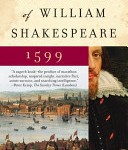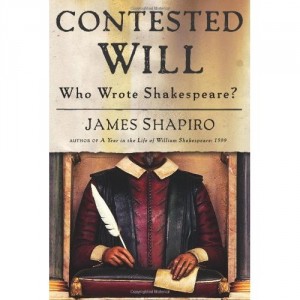 The Times, April 20 2012. Dans un article intitulé « How I came to love Shakespeare », le célèbre universitaire américain James Shapiro (Columbia University), auteur des biographies 1599: A Year in the Life of William Shakespeare (2005) et de Contested Will (2010), raconte comment il en est venu, contre toute attente, à aimer le barde qu’il détestait quand il n’était encore qu’un étudiant et à faire connaître et aimer son oeuvre.
The Times, April 20 2012. Dans un article intitulé « How I came to love Shakespeare », le célèbre universitaire américain James Shapiro (Columbia University), auteur des biographies 1599: A Year in the Life of William Shakespeare (2005) et de Contested Will (2010), raconte comment il en est venu, contre toute attente, à aimer le barde qu’il détestait quand il n’était encore qu’un étudiant et à faire connaître et aimer son oeuvre.
What a warning against misspent intellectual energy,” James Shapiro says. Shapiro, among the world’s leading Shakespeare scholars, turns the pages of a signed first edition of a sumptuous antiquarian volume with the emphatic title Bacon is Shakespeare and shakes his head in wonder. Published in 1910 by a minor baronet and sometime MP called Sir Edwin Durning-Lawrence, it’s one of the worst books on literature yet written. It’s a present from my own collection, and Shapiro is one of the few people in the world who would accept it with unfeigned delight rather than an incredulous fixed grin.
We are at the Globe theatre in London, as Shapiro tells me about his efforts to expand public appreciation of Shakespeare. A dispiriting but necessary task of his work is to counter the hoary Victorian conspiracy theory, which has gained new impetus in the digital age and with Roland Emmerich’s recent film Anonymous, that the works of Shakespeare were in reality written by a great nobleman or statesman. But first we talk of more creative ventures.
The BBC will shortly screen a three-part documentary series presented by Shapiro on Shakespeare in the Jacobean age. Shapiro was also thrilled this week to open a new British Museum exhibition on the role of coins in Shakespeare’s work. Coins, says Shapiro, change the way you think about culture.
“Imagine,” he says, “a pouch containing Jacobean and Elizabethan coins. You’ll know about a country’s rulers, its economic strength and the value of things.”
Coins are among the ways in which we can learn more about Shakespeare’s times and world view, and this fascinates Shapiro. In the exhibition, he explains, there is a “little porcelain jug with a slot big enough to fit a coin”. This is where the theatregoers of the time would pay their entrance fee. At the end of the performance, the porcelain would be smashed and the owners of the company would share the coins. “This is what enabled Shakespeare to write,” Shapiro says. “When the remains of the Rose theatre were discovered, so were the smashed porcelain vessels.”
 The notion of the poet who transcends history is one of Shapiro’s longstanding targets. A professor of English at Columbia University, Shapiro found fame in 2005 with his biography 1599: A Year in the Life of William Shakespeare. A volume that had initially been rejected by publishers as a quixotic project won the Samuel Johnson Prize for Non-Fiction and changed Shapiro’s career.
The notion of the poet who transcends history is one of Shapiro’s longstanding targets. A professor of English at Columbia University, Shapiro found fame in 2005 with his biography 1599: A Year in the Life of William Shakespeare. A volume that had initially been rejected by publishers as a quixotic project won the Samuel Johnson Prize for Non-Fiction and changed Shapiro’s career.
By considering the work that was available to Shakespeare when he wrote — not only the source material but also the commercial and religious temper of the times — Shapiro illuminated the richness of the Bard’s creative life in a crucial year. He argues against the temptation of seeing Shakespeare as a man of our times rather than of his. Shakespearean biography, in his view, is a “necessary fiction”. Shapiro’s understanding of those times is of direct help to actors.
He is particularly involved with the Royal Shakespeare Company, though he is modest about the limits of his understanding. Shapiro believes that, as an American, he will never fully be able to grasp the nuances of Twelfth Night. “I can’t register properly the subtle distinctions in the English class system,” he says. But theatre players seek his advice, and he accordingly considers himself “one of the luckiest theatregoers alive”.
Shapiro continually reflects on this good fortune, which is all the greater because he came to Shakespeare late. “As a student, I hated Shakespeare,” he says. “I didn’t grasp why everyone was so excited. To me, these were just words on the page.” His epiphany came when, like so many of his generation, he took advantage of cheap flights from the US to Europe in the early 1970s. He started seeing plays and became hooked.
“By the time I was 25, I’d seen around 200 plays,” he recalls. “I kept a diary the loss of which on a train journey distressed me more than any loss ever has.” His experience in coming to Shakespeare through theatregoing rather than academe has, he believes, helped his work. “I’m writing for people who feel cut off from the works, who don’t get it and want to understand.”
 This was Shapiro’s motivation for 1599, which he worked on for 17 years. He is writing a successor volume dealing with the year 1606, when Shakespeare was finishing King Lear. But his intervening volume, called Contested Will, published in 2010, dealt not with Shakespeare but with a particular heretical belief about him: the thesis that the actor from Stratford was merely a frontman for the Earl of Oxford, or Francis Bacon or some other distinguished figure. It is a remarkable work of cultural history in which Shapiro sets himself to do what no other scholar has done: to explain why this notion gained popularity when it did — after the Romantic movement, with its stress on the isolated genius, and in the Victorian and Edwardian ages, when class distinctions were more prominent than they are now.
This was Shapiro’s motivation for 1599, which he worked on for 17 years. He is writing a successor volume dealing with the year 1606, when Shakespeare was finishing King Lear. But his intervening volume, called Contested Will, published in 2010, dealt not with Shakespeare but with a particular heretical belief about him: the thesis that the actor from Stratford was merely a frontman for the Earl of Oxford, or Francis Bacon or some other distinguished figure. It is a remarkable work of cultural history in which Shapiro sets himself to do what no other scholar has done: to explain why this notion gained popularity when it did — after the Romantic movement, with its stress on the isolated genius, and in the Victorian and Edwardian ages, when class distinctions were more prominent than they are now.
“I was able to go to vast primary sources,” says Shapiro in explaining why he wrote the book. “And very few Shakespearean scholars had read these works. What they showed was that smart people can say dumb things.”
The modern conspiracy theorists, who mainly argue the purported claims of Edward De Vere, the 17th Earl of Oxford, were initially thrilled that a genuine scholar was to write about their movement, but dismayed when they found that Shapiro had produced a work of intellectual depth rather than meet them on their own territory. “They accused me of character assassination of their theorists,” Shapiro says, “and that’s unfair.”
The “smart person” above all others whom Shapiro cites in this so-called Oxfordian movement is Sigmund Freud, who held to the dogma that the provincial actor-manager from Stratford could not have had the education to write the plays. Far from being ungracious to Freud and others, Shapiro stresses his admiration for them despite their errors. He cites the sad case of the American, Delia Bacon (no relation), in the mid-19th century, who was the first major theorist arguing that Francis Bacon wrote the Bard’s works. Her monomania drove her mad.
“These were big-ideas people,” says Shapiro. “Delia Bacon wanted to change the narrative of the founding of the United States. Freud changed how we think about human identity.” The first theorist of the Oxfordian case was a Gateshead schoolmaster in the 1920s with the unimprovable name of J. Thomas Looney. Unlike any of Looney’s modern imitators, Shapiro looked into Looney’s thinking and found him to be a devotee of an essentially feudal political outlook and philosophy. Modern anti-Shakespeare conspiracy theorists are thereby committed to some highly reactionary notions. But their founders, while totally mistaken, are intellectually interesting.
“They were disappointed thinkers,” Shapiro suggests. “And it’s very interesting when powerful minds find their ideas frustrated.” In this bizarre literature, I had found there was a gap in Shapiro’s private collection. Hence my gift of the Durning-Lawrence volume, complete with a fragile press cutting from 1910 in which the author expounded his ill-tempered crank ideas. I meant it as a compliment to Shapiro (which he accepted) that the volume could have no better home than on his shelves.
“Modern conspiracy theories,” Shapiro explains, “are not interesting.” And this is where the heresy over Shakespearean authorship now stands. But Shapiro worries that bad ideas can find new impetus in the digital age, through Wikipedia and other media that are so democratic (contrary to Looney’s own philosophy) that anyone can join in regardless of competence. He was especially concerned with the damaging potential of Anonymous, but its poor critical reception and box- office receipts have, he says, “restored my confidence. I had real gratification when Emmerich blamed the Shakespeare Birthplace Trust and me”.
While Shapiro emphasises that Shakespeare must be understood in the spirit of his age rather than ours, he believes passionately in the power of art to illuminate the human condition. We talk of a political campaign, which has drawn the support of such notable theatrical personalities as Mark Rylance and Caryl Churchill, to persuade the Globe to cancel a performance by Habima, an Israeli theatre company.
Shapiro, who has taught in Israel, is dismayed by these calls for a boycott. “I’m as critical of the Israeli Government as anyone,” he says. “But it’s extraordinary that people in the theatre should wish to silence a company that exposes the faultlines in Israeli society. It’s fundamentally ignorant to censor and suppress art. I hope the Globe will be wise enough not to rescind the invitation.”
As we part, I take my copies of Shapiro’s own books, which he’s inscribed, and he thanks me effusively for a worthless but handsome volume by an Edwardian eccentric who loathed the idea that great art could have been created by a jobbing actor from Warwickshire.
I’m glad of the exchange. »
http://www.thetimes.co.uk/tto/life/article3389516.ece
Merci à Jean Sabiron.
POUR EN SAVOIR PLUS:
♣ http://authors.simonandschuster.com/James-Shapiro/1862215
♣ « Who wrote Shakespeare? » www.youtube.com/watch?v=pHApDxuGgw8

